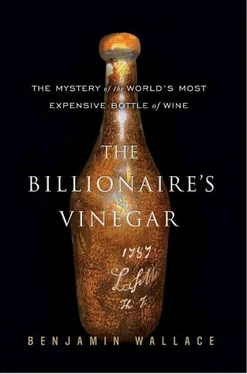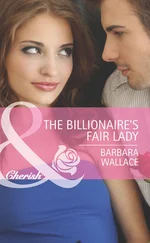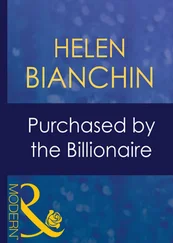Koch’s lawyers now sent letters to Christie’s, Zachys, Farr Vintners, Royal Wine Merchants (the company of Jeff Sokolin and Daniel Oliveros), a Washington State importer named Bordeaux Wine Locators, which had been the consignor of many of the questionable bottles Koch had bought at auction, and collector Eric Greenberg, among others, warning them not to destroy any documents. Koch’s attorneys were getting ready to serve a raft of subpoenas. “That’s the day a lot of assholes are going to pucker,” said Brad Goldstein, who seemed invigorated by the whole affair.
Goldstein snidely referred to Greenberg, who had been invited by Steven Spielberg to join the Survivors of the Shoah Visual History Foundation and then been given its Ambassadors for Humanity award, as “Mr. Shoah.” Goldstein was practically salivating at the prospect of deposing Rodenstock: “It will be a show trial.” The aggressive newsmagazine Stern was “like the Gestapo,” Goldstein said approvingly. A German journalist who seemed to be falling prey to Rodenstock’s misdirection, on the other hand, was wasting his time “separating fly shit from pepper.”
A lot of stones were about to be overturned. Numerous wine-world icons—Shanken and Wine Spectator , Parker and The Wine Advocate, Rodenstock, Robinson, Broadbent and Christie’s, Farr Vintners, Riedel—had been touched by the affair. Scores of tasting notes would need to be reconsidered, if not discarded. Jancis Robinson hopefully suggested that the whole thing could be “cathartic” for the business. She had always considered the Jefferson bottles “an intriguing and suspicious mystery,” she said later, but when she now asked Rodenstock exactly how many of the bottles had been in his original find, and he answered “about thirty,” she was struck by his vagueness about such valuable objects.
Robinson found herself becoming more cautious. When she was asked to conduct a tasting in March at the Palais Coburg in Vienna, which would feature a ’34 Romanée-Conti, she asked for a complete list of where the hosts had obtained the wines. “It was probably looking a gift horse in the mouth, and I felt bad doing it,” she said later, “but I didn’t know them.”
The same month, the Wall Street Journal reported that the FBI’s art fraud unit had opened an investigation into counterfeit wine, and that a grand jury in New York was hearing evidence. Subpoenas had been sent to Christie’s, Sotheby’s, and Zachys.
In Bordeaux, where for years most châteaux had done little to stanch the problem, some owners were jubilant, or at least ready to face the problem head-on. “We are very pleased,” said Christian Moueix of Château Pétrus, “that this has finally become a scandal.” When Robinson traveled to Bordeaux in April for the annual en primeur barrel tastings, the first thing that Château Margaux owner Corinne Mentzelopoulos said to her was “Now, what are we going to do about this fake business?”
If any person or business was going to benefit from the mess, it was Sotheby’s, and more than one observer saw a subtle Sotheby’s revenge plot playing out. Christie’s had long been aligned with Rodenstock, and not only through Broadbent. When Christopher Burr, who briefly headed Christie’s wine department after Broadbent, helped put together a tasting in Paris in 2001, he later wrote that it had been a challenge “assembling the best of these wines from unquestionable provenance, no mean task, but fortune and some visionary wine men helped, such as Hardy Rodenstock—a legendary wine collector.” It was entirely possible that the bottles were all real, but if Rodenstock’s name stood for one thing, it was questionable, not unquestionable, provenance.
Serena Sutcliffe, meanwhile, had spent the last fifteen years positioning the Sotheby’s wine department as the discriminating auctioneers, the house that didn’t sell Rodenstock’s bottles and that was vocal about the rising problem of counterfeit wine. While still lagging behind Christie’s wine department overall, Sotheby’s had pulled ahead of it in the important North American market. Koch, having used Christie’s when he sold part of his collection in 1999, had since seemed to subtly shift his allegiance to its rival. In early 2006 he was scheduled to host a wine event with Sotheby’s North American wine director, and it was a former Sotheby’s wine head, David Molyneux-Berry, whom Koch hired to vet his cellar as part of the investigation. It was also Sotheby’s that tipped off Russell Frye to the problems of his cellar and put him in touch with Molyneux-Berry, through whom he joined forces with Koch. As if to cosmically rub the turn of fortunes in Broadbent’s face, five weeks before Koch filed suit, France, in recognition of her promotion of its wines, made Serena Sutcliffe the first member of the British wine trade to be awarded the Légion d’honneur.
“Sotheby’s must be gleeful!” Broadbent remarked bitterly after Koch’s suit was filed.
IN JUNE 2007, nearly a year after Koch sued, Rodenstock found a way, at least temporarily, to wriggle free. He had hired a German lawyer at a New York firm to defend him and endured months of pretrial motions and preliminary discovery. On June 1, Rodenstock’s lawyers received a stack of discovery documents from Koch, including the e-mail correspondence between Koch’s office and Andreas Klein, Rodenstock’s former Munich neighbor and landlord. Later that same day, Rodenstock sent a fax directly to the judge overseeing Koch v. Rodenstock and pled his case. Koch, he said, was “a psychopath.”
“You will surely understand that I don’t want to have dealings with such a person,” Rodenstock wrote, adding that “the quarrel with him has come up to a more than primitive level I don’t want to bear any longer.”
Later, Rodenstock informed the court that he had spent more than $150,000 in legal fees and was not able “to continue to participate in the proceeding.” His lawyer petitioned the court to withdraw as Rodenstock’s counsel, and Magistrate Judge Debra Freeman scheduled a teleconference with Rodenstock’s and Koch’s lawyers and Rodenstock himself. Rodenstock, however, refused to take part, saying through his lawyer that he “cannot accept the friendly offer of a telephone conference, for which he thanks the court.”
The court was not moved by his gratitude. “Contrary to Mr. Rodenstock’s prior understanding,” Judge Freeman wrote in a June 22 order, “the Court is not extending him a ‘friendly offer’ to participate in a conference. Rather, the Court is ordering Mr. Rodenstock to appear on July 5, in person or by telephone, and he is cautioned that his failure to appear may result in the imposition of sanctions against him. ”
Rodenstock asked for and was granted a week’s reprieve, and in the meantime his Munich lawyer sent a letter to Andreas Klein—and to Klein’s mother-in-law and former employer (from whose e-mail server Klein had written to Koch)—threatening a libel suit. The New York case conference finally took place on July 11, in a courthouse in lower Manhattan, only one block from City Hall, where Rodenstock had married Helga Lehner in October 1991 (on that occasion, he had given his father’s name as “Alfred Görke Rodenstock”). It was a strangely disembodied affair. Both Koch and Rodenstock dialed into the courtroom’s speakerphone, with an interpreter hired by Rodenstock’s New York lawyer standing by to translate Rodenstock’s testimony. Rodenstock said that because he had no residence in the United States, and hadn’t sold bottles to Koch directly, he had been “sued in an illegal way” and was not subject to the New York court’s jurisdiction. He no longer intended to pay for counsel, or even to take part in the suit. In short, and after several warnings from the judge, he stated his intent to default. He would fight Koch in The Hague, if necessary, Rodenstock said. Judge Freeman asked if Rodenstock wished to say anything else. “Thank you very much for everything and for the phone conference,” Rodenstock said.
Читать дальше












